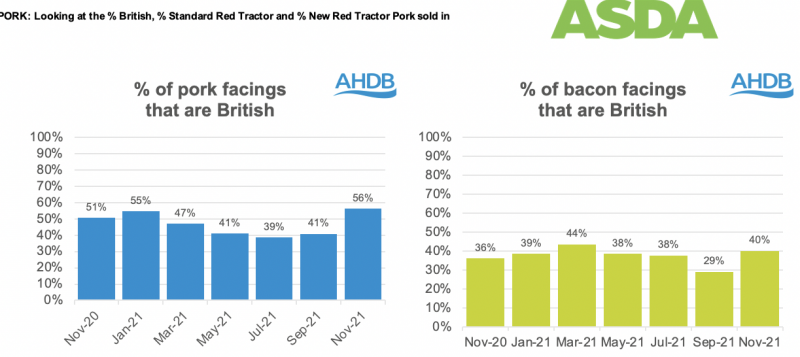Asda drives increase in British pork on display on retail shelves
16th Dec 2021 / By Alistair Driver
A big increase in the volume of British pork on Asda’s shelves has driven a healthy overall rise in British pork on display across the big UK retailers, according to the latest AHDB Porkwatch survey.
Over the 11 retailers surveyed, the proportion of British pork facings increased from 77% in September to 80% in November. This compared with 79% in November 2020.
British bacon facings were up from 54% in September to 56%, while ham was down from 65% to 63% and sausage from 87% to 86%.
The fresh pork figure will be welcomed as the UK pork sector struggles with a backlog of pigs on farm and dire financial situation, particularly at a time when there are large volumes of significantly cheaper EU pork available to UK retailers.
The main reason for the much-improved fresh pork figure is a big shift in Asda’s purchasing habits – its fresh pork facings were up from 41% in September to 56% in November. This compares with 51% in November 2020 and just 39% in July 2021.
Asda’s bacon facings were also significantly up, from a recent low of 29% in September to 41% in November, while its ham facings were up from 26% to 29% and sausage facings were stable at 83%.

Asda has generally posted the lowest figures, with the exception of recent addition, Iceland, when it comes to British pork on display in previous surveys.
But the November survey puts it broadly on a par with Tesco, which saw little change from September, with fresh pork facings up from 55% to 56%, alongside minimal change in the other categories, recording 38% in bacon, 59% for ham, and 83% sausage.
Elsewhere:
- Aldi, Budgens, Co-op, M&S, Morrisons, Sainsbury’s and Waitrose all recorded 100% on fresh pork, with Lidl on 99% and Iceland just 22%.
- Stocking a high proportion of British overall were M&S, with 100% on bacon and sausage and 96% on ham, the Co-op at 100% British bacon, 95% on ham and 85% on sausage, and Waitrose at 97% on sausage, 93% on ham and 85% on bacon.
- Aldi’s British sausage facings were 100% British, with ham up from 81% at 85% and bacon at 47%.
- Sainsbury’s – bacon 65%, ham 92% and sausage 88% - and Morrisons – bacon 56%, ham 66% and sausage 80% - showed generally good support for British producers.
- Lidl was down to 27% on bacon, from 40% in September, down to 44% on ham (from 52%) and down to 92% on sausage (from 94%).
- Iceland was at a different level altogether, however, with bacon at just 11%, ham at 29% and sausage 59%.
- Overall, across the 11 supermarkets, Red Tractor facings were up from 50% to 54% for fresh pork, up from 21% to 24% for bacon, up from 17% to 18% for ham and unchanged at 53% for sausage.
NPA reaction
The NPA wrote to all the big retailers in October seeking commitments to back British producers during the current crisis.
NPA chief executive Zoe welcomed the general trends in this latest survey, but said there was still more retailers could do to support to struggling British pork producers.
“As always, we thank those retailers stocking 100% British pork or close to it and using that as a selling point to consumers.
“And I also want to single out Asda for the great strides it has made in increasing the proportion of British pork on its shelves. That has made a real difference and we look forward to seeing even further progress in the next Porkwatch survey!
“But it is disappointing to see no real progress in Tesco stores. We would love to see more British products on their shelves as we approach Christmas.
“There is no doubt that demand for fantastic British pork remains strong. We continue to urge all retailers to do what they can to support producers during this crisis - whether through prioritising British pork over imports, wherever feasible, and promoting that to consumers, working with the supply chain to ease the backlog, or guaranteeing a sustainable price for pig producers, as Waitrose has done."